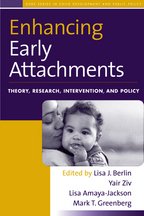Enhancing Early Attachments
Theory, Research, Intervention, and Policy
Edited by Lisa J. Berlin, Yair Ziv, Lisa Amaya-Jackson, and Mark T. Greenberg
Paperback
Paperback
orderJanuary 9, 2007
ISBN 9781593854706
Price: $58.00 357 Pages
Size: 6" x 9"
Copyright Date: 2005
“In a nutshell, exceptional!...It is one of the first books to offer researchers, practitioners, and policymakers a collection of efficacious, theoretically, and empirically grounded interventions to enhance attachment relationships between at-risk parents and their infants or young children, and the policy, political, and logistical strategies to help them succeed. One of the exciting features of this book is that the rigor and integrity to attachment theory in these intervention programs is clearly evident even though the language used to present these complex concepts to parents is sometimes stunningly simple and clear. From the attachment purists to the lesser initiated who share similar goals of affecting change in relationships between parents and young children, this book is a must read. The chapters resonate with attachment theory's propositions and conceptual complexity while also leaving the reader with the knowledge and framework for change in these attachment relationships. This merger of the integrity to attachment theory with efficacious, but often common-sense interventions is what makes this book so valuable....The book is outstanding....Several chapters are written by 'the best of the best' that the attachment field has to offer, an opportunity few books provide....Indeed, this book will appeal to any reader who ventures into its pages because it represents real hope and potential to effect change.”

—Child and Adolescent Social Work Journal
“Represents a pioneer step forward in describing attempts to prevent disturbances in the parenting of very young children by applying principles of John Bowlby's attachment theory....One of the special contributions of this volume is the description of programs to build attachment relationships in particularly difficult situations....This volume gives us a glimpse into the complexities of providing services to multiproblem families in which insecure attachments urgently need to be prevented or changed.”

—PsycCRITIQUES
“This is a valuable resource for any organization, program, group, or individual who is using a preventative orientation to working with children and their families.”

—Child and Family Journal
“This is the first serious, empirically grounded integration of attachment-focused interventions in the first years of life. It is authoritative, comprehensive, and balanced—not surprisingly, as it is authored by the acknowledged leaders in the field. By far the best available synthesis to date, and one that is likely to guide practice over the next decade.”

—Peter Fonagy, PhD, FBA, Department of Clinical Psychology, University College, UK; and Anna Freud Centre, London, UK
“This highly readable volume from leading experts in attachment research and intervention has much to offer to students, practitioners, and researchers. It provides key overviews of various approaches to attachment-based interventions and discusses the theory and research underlying the programs. The book also identifies useful directions for the next generation of attachment-based intervention and prevention programs.”

—Byron Egeland, PhD, Institute of Child Development, University of Minnesota
“The essential engine of human growth and development lies in relationships, starting with the interactions between infants and the important adults in their lives. While the basic science of attachment behavior is well established, this volume moves on to applying this knowledge to strengthening early relationships in at-risk populations. The editors have assembled a stellar group of scholars to present the finest thinking on effective attachment interventions. Their ideas will enrich the thinking of scholars, graduate students, and practitioners in the early childhood field.”

—Edward Zigler, PhD, Department of Psychology (Emeritus), Yale University
—Child and Adolescent Social Work Journal
“Represents a pioneer step forward in describing attempts to prevent disturbances in the parenting of very young children by applying principles of John Bowlby's attachment theory....One of the special contributions of this volume is the description of programs to build attachment relationships in particularly difficult situations....This volume gives us a glimpse into the complexities of providing services to multiproblem families in which insecure attachments urgently need to be prevented or changed.”
—PsycCRITIQUES
“This is a valuable resource for any organization, program, group, or individual who is using a preventative orientation to working with children and their families.”
—Child and Family Journal
“This is the first serious, empirically grounded integration of attachment-focused interventions in the first years of life. It is authoritative, comprehensive, and balanced—not surprisingly, as it is authored by the acknowledged leaders in the field. By far the best available synthesis to date, and one that is likely to guide practice over the next decade.”
—Peter Fonagy, PhD, FBA, Department of Clinical Psychology, University College, UK; and Anna Freud Centre, London, UK
“This highly readable volume from leading experts in attachment research and intervention has much to offer to students, practitioners, and researchers. It provides key overviews of various approaches to attachment-based interventions and discusses the theory and research underlying the programs. The book also identifies useful directions for the next generation of attachment-based intervention and prevention programs.”
—Byron Egeland, PhD, Institute of Child Development, University of Minnesota
“The essential engine of human growth and development lies in relationships, starting with the interactions between infants and the important adults in their lives. While the basic science of attachment behavior is well established, this volume moves on to applying this knowledge to strengthening early relationships in at-risk populations. The editors have assembled a stellar group of scholars to present the finest thinking on effective attachment interventions. Their ideas will enrich the thinking of scholars, graduate students, and practitioners in the early childhood field.”
—Edward Zigler, PhD, Department of Psychology (Emeritus), Yale University



